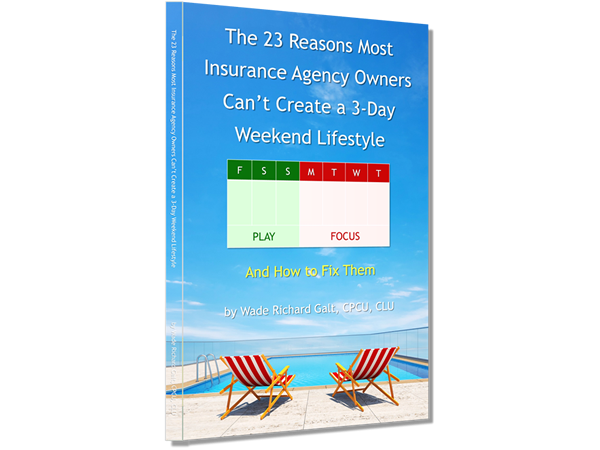14. Profit - Step 11 to Create an Automatic Insurance Agency
You have (at least) TWO businesses in your agency… Your Renewal Business and your New Business. Both need to be profitable for things to go smoothly.
Quick Summary
-
To achieve profitability, agency owners should focus on establishing clarity regarding purpose, vision, roles, compensation, accountability, and optimization before scaling.
-
Agency owners need to delegate tasks to the right people and recruit individuals who can effectively contribute to executing the agency's mission and vision to ensure efficient workflow and profitability.
-
Depending on factors like local premiums, expenses, and operating costs, agency owners can find themselves in different income situations.
-
There are three common income scenarios for agency owners: (a) being an employee of the agency, where income is derived from new sales and company bonuses; (b) breaking even after making adjustments to base salaries and expenses; and (c) generating profit from renewal business, resulting in residual income.
-
It is crucial for agency owners to focus on profitability in both renewal and first-year income for sustained success.
Full (Edited) Transcript
Profit - Step 11 to Create an Automatic Insurance Agency
Most agency owners want to be as profitable as possible as quickly as possible, but they often don't know how to do this. Like the recruiting. This is one of the reasons we save this piece towards the latter part of the process. Unless there's something drastically going wrong in the agency, we get clear about our purpose, our vision, the role, clarity, how we're compensating people, how we're holding them accountable. We next get clear about our sales processes for retention and acquisition and pivoting and multi lining.
And then we start looking at the people we need to delegate to and to recruit in order to best help us execute our mission and our vision. Then we look to make sure we're optimizing our profit before we scale the agency. Just like real estate. If you buy bad real estate that loses you money, buying more of it is not a good thing. We want to make sure that what we scale is going to be something that's already profitable.
And then knowing all the other things we know based on the previous stages, we scale accordingly. If you're an insurance agent owner, your income can likely look like any one of these pie charts, you might be taking them or or of your agency growth. Now, of course, some of this depends on local factors such as premiums and agency expenses in the area, operating expenses and so on. But overall, I've seen people at just about every income level, gross income wise be in any of these situations no matter what your agency size.
We want to make sure you're being paid like a business owner.
Here are three scenarios that happen very often. The first situation is when an agency is upside down and we're going to look at $100,000 of PNC renewals, and I'm not going to assume that your agency only has 100. But let's say for every $100,000, this is what's happening. One person, a retention team member often has a base salary of roughly $30,000. Then another team member, a multiline salesperson, has a base salary of $30,000.
There's $20,000, a fixed overhead, the office, the chair, the electricity, and so on. And then each of those team members has another 15,000 of expense, so that there's 110,000 of expense for every hundred thousand of PNC renewals. Every 100,000 PNC renewals is costing the agency owner $10,000. And so we need to make up income with new sales and with company bonuses. So this agency owner is really an employee of the agency.
They're not getting to be an owner in this second scenario. Very often, what happens after this has happened for a while, the anyone will look to do something either with base salaries or slightly reduced expenses, and then they'll get to a break even. But we're still in a similar situation. We need to make income with new sales and company bonuses. So again, the agency owner is an employee.
In the third scenario, there's profit for the agency owner. For the 100,000 P and C renewals, we have a $30,000 base salary, 20,000 of fixed overhead and 15,000 of overhead for that team member. So the total overhead is 65,000, allowing for a $35,000 profit on every $100,000 of P and C renewals. So if the agency had two times this, there'd be $70,000 a profit for the agency owner, and that's whether or not they're actively working on that retention business. Obviously they're still doing something.
But this is more of that residual income. That semi passive income that is name showner is part of the reason why you signed up for this business model. Next, we need to make sure that you have the right number of team members in your agency. So based on the size of your PNC renewal book would determine how many retention team members you have for your PNC growth experts, your acquisition people, it's really all about. Can they generate enough to cover themselves?
And then there might be another multiline team member, or you might be somebody that's either working in a little bit all three of these roles from a CEO perspective or directly in the multiline perspective. But overall, you being very clear about what your role is, where you're supposed to be doing things and knowing how many people you need to get the job done. So you're not over staffed. Overall, we want to make sure that both of your agencies are profitable, your renewal agency and your first year income agency.
So if you work with an accountant and they specialize in insurance agencies, one of the things they could do if they really understood insurance agency would be to say, let's look at first the profit in your renewal business.
Let's see what the income is. Let's see what the expenses are, the cost of the building, the base salaries, the other overhead. And let's see what your agency renewal profit is. And from that agency renewal profit, then we're going to look at what's your salary is. The agency owner is the CEO.
What are the other benefits we have for you? And then see if there's any profit there. So that's the renewal book, then you want to look at your first year sales and Commission and see what are those? And then what are the bonuses you're paying out? What are your acquisition costs to get that business?
Is that making a profit and other bonuses for you? And if both of those agencies are profitable, well, the whole agency is going to be profitable. And while that seems kind of obvious, one of the downfalls that really hurts a lot of agencies is they'll have profit in that renewal agency, and then they'll over invest in either staffing of team members or in paid advertising to where that first year agency will run a loss. And then it'll actually dig into their profits and make the total profit less than it would have been if they simply just focus on their renewal book.
That's not to say we don't want to grow the business.
We simply want to grow it profitably at the very worst. We want this first year agency to be a break even. We don't want it costing us money, and we only want that if we're in a hot market and or if we know that we have good renewal rates that our clients are going to stick with us. On the other hand, if we know our clients aren't sticking loan, the market is not very loyal at the moment, or we simply haven't figured that out. Then we don't want to be paying all of our first year knowing there's nothing to renew.
Ideally, we want to have the same profit percentage on our renewals and our first year, so it's consistent across the board. So if of your income is coming from your renewals and 20% from first year, we want a similar balance in our expenses and in our profit. If you had a food truck and a magazine subscription business, you want to make sure that each of those were profitable, you wouldn't want to say, well, the magazine subscription business is a repeat income business, and since it's making money, I'm going to take money from that and I'm going to put it into this food truck and the food truck is going to lose money for me.
And that's okay. Now you just say at the very least, let's just get out of the food truck business in a similar way.
We want to make sure both parts of your business are profitable. All that being said, we definitely want to grow. We simply want to grow wisely and profitably. So hope you find this helpful. In our next video, we'll talk about creating an automatic lifestyle where you can play first and really enjoy your life outside of work.
As always, look forward to helping you help more people and make more money in less time. Do what you do best so you can better enjoy your family, your friends, and your life. Thanks for listening.
Get the eBook

Start Working Less & Making More
At least 5 of these obstacles are hurting your Production, and Income, Freedom. Start fixing them now!
We won't send spam you. Unsubscribe at any time.
eBook will be emailed to you.Schedule a Strategy Session
We’ll Discuss Your
- Biggest Goal - If you or your agency could only achieve 1 thing in the next 12 months, what would it be?
- Value of Biggest Goal - What's it worth to you (money, free time and / or happiness) to achieve this goal?
- Biggest Frustration - If you could "fix" 1 thing in your agency in the next 12 months, what would it be?
- Frustration Cost - What is your biggest frustration COSTING you (money, free time and / or happiness)?
Then, We’ll Discuss the Plan & Expected Results
- Which goal(s) are likely to be achieved and how long it usually takes, based on our experience.
- The best way to help you achieve your goals, based on your style and time available to implement.
- Your anticipated time investments & money investments.
- What guarantees we can make









